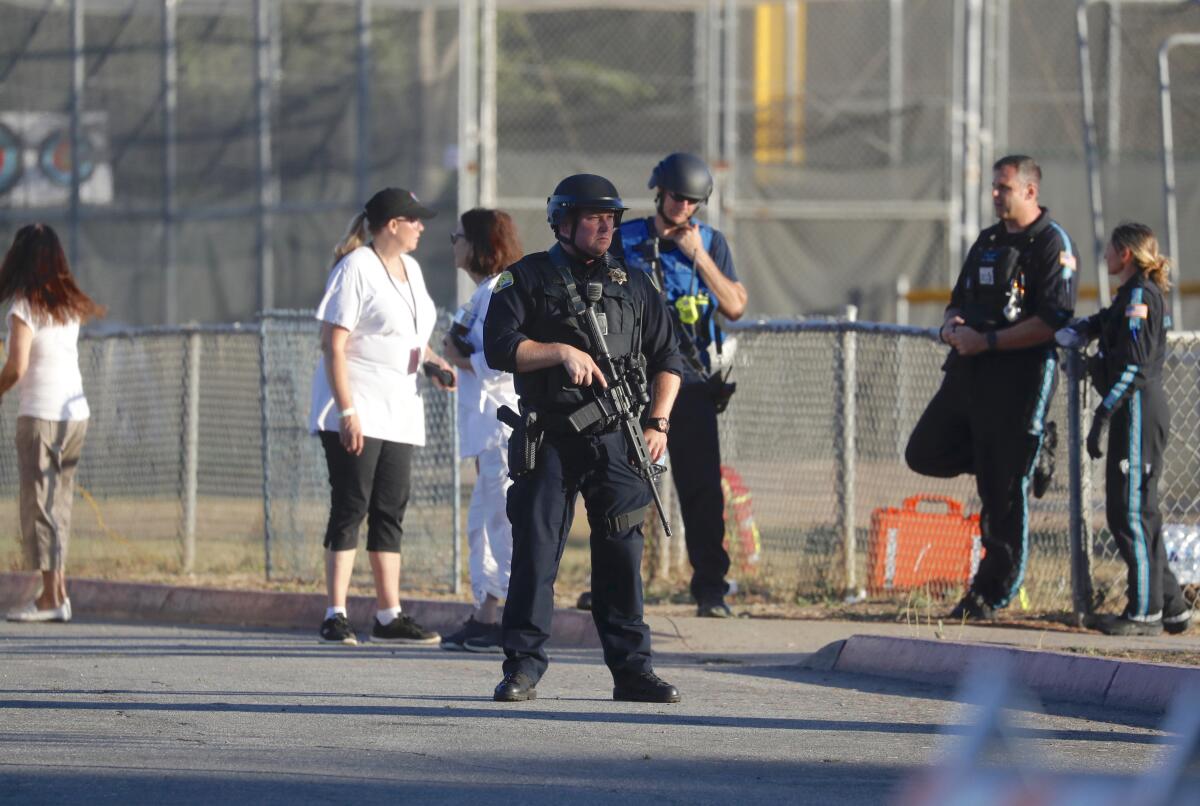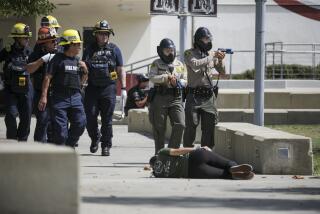California could expand use of gun violence restraining orders under bill sent to governor

- Share via
SACRAMENTO — California teachers, school administrators and employers could ask the courts to take guns away from people they see as a danger to themselves or the public under a major expansion of the state’s “red flag” law approved by the Legislature on Monday and sent to Gov. Gavin Newsom.
In response to a string of mass shootings, the governor has said he is interested in expanding the state’s gun restraining order law, which for the last four years has allowed family members and law enforcement officers to ask courts to seize firearms from people deemed a public risk. Legislators have offered half a dozen proposals this year to broaden the law’s reach.
On Monday, the state Assembly gave final approval to a measure that would allow employers, co-workers and high school and college teachers and administrators to petition the courts to remove guns from employees and students.
“Given what we have seen from the mass shootings in most recent days, expansion like this would be very, very helpful,” state Sen. Nancy Skinner (D-Berkeley), chairwoman of the Senate Public Safety Committee, said during the floor debate.
Assemblyman Phil Ting (D-San Francisco) introduced the bill following a February 2018 shooting that left 17 people dead at a high school in Parkland, Fla. He noted some school officials had raised concerns about the behavior of the 19-year-old gunman before the shooting.
“There’s no question in my mind that California’s Gun Violence Restraining Order law is a powerful tool that helps save lives,” Ting said Monday. “With school and workplace shootings on the rise, it’s common sense to give the people we see every day a way to prevent tragedies.”
The measure would take effect in September 2020 to allow the new process to be implemented.
Newsom, who was a leading proponent of the gun-control initiative Proposition 63 in 2016, has not yet committed to signing any gun bill this year, but he said in recent months that he was interested in pending proposals.
“There are a number of legislative efforts upstairs that I look forward to getting [on my desk] downstairs to expand the scope of the red flag laws,” Newsom said in June.
Former Gov. Jerry Brown vetoed the same bill last year, saying the expansion of the “red flag” law was unnecessary.
“All of the persons named in this bill can seek a gun violence restraining order today under existing law by simply working through law enforcement or the immediate family of the concerning individual,” Brown wrote. “I think law enforcement professionals and those closest to a family member are best situated to make these especially consequential decisions.”
Ting’s bill, which requires teachers to go through school administrators for restraining orders, was also opposed by groups that advocate for gun owners, including the California Rifle & Pistol Assn. and National Rifle Assn.
Civil libertarians have objected to the fact that the law allows guns to be removed for up to 21 days before a court hears the testimony from the person losing the firearms. A hearing with the gun owner could extend the order for up to a year.
The measure was also opposed by the American Civil Liberties Union of California, which says it “poses a significant threat to civil liberties by expanding the authorization to seek ex parte orders, with all the ensuing consequences, without an opportunity for the person to be heard or contest the matter.”
The Legislature also voted Monday to send the governor a bill that would streamline the restraining order law by allowing people subject to an order application to voluntarily relinquish a gun and not contest a petition by others.
The original law allowing restraining orders was enacted in 2016 following an Isla Vista mass shooting involving a man whose family members had earlier contacted authorities with concerns.
In the last four years, judges have ordered the temporary removal of firearms from more than 600 people after family members or law enforcement officers petitioned the courts.
A study last month by UC Davis researchers said the law appeared to have helped reduce gun violence. The study examined 21 cases of people who had firearms removed or purchases blocked because of court orders and said none of them later was involved in gun-related violence.
Lawmakers also gave final legislative approval Monday to a bill that prohibits people subject to restraining orders in other states from keeping guns in California.
Lawmakers are also considering Assembly Bill 12, which would extend gun violence restraining orders from a year to five years while allowing gun owners to annually petition the court for return of their firearms.
Changes to the red flag law would “have the potential to remove the burden on family members and law enforcement who may not continue to have contact with the restrained individual from having to annually petition the court for an extension,” said Assemblywoman Jacqui Irwin (D-Thousand Oaks).
Another bill sent to the governor Monday would lift the $100 cap on fees that counties can charge for concealed weapon permits so the agencies can recover all of their costs in processing the applications.
Newsom was also sent a measure aimed at dealing with guns that are home assembled and therefore not traceable. The bill would require, starting in 2023, that precursor parts be purchased through a licensed dealer so they are subject to registration and background checks.
More to Read
Sign up for Essential California
The most important California stories and recommendations in your inbox every morning.
You may occasionally receive promotional content from the Los Angeles Times.











